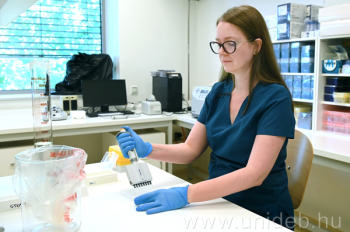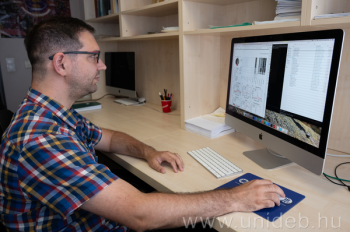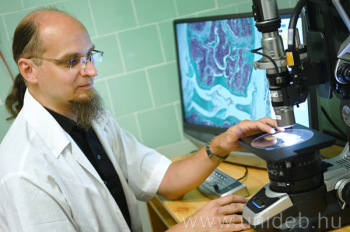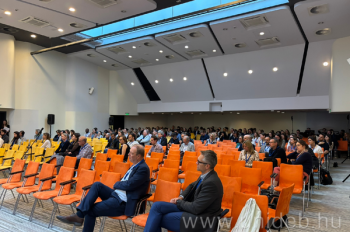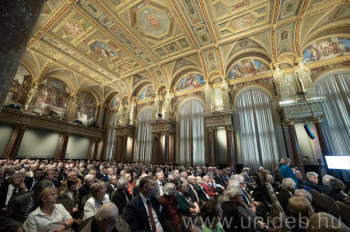The research group headed by Assistant Professor Eszter Csoma has won the Count István Tisza Foundation for the University of Debrecen and the University of Debrecen Publication Award for its scientific article summarizing research findings on polyomaviruses. Regarding the new polyomaviruses that infect both animals and humans, there are still quite a few unanswered questions. The primary focus of the investigation of the researchers was if the viruses are currently present in Hungary, at what age we tend to get infected, and if they infect our respiratory tract.
Hírek Faculty of Medicine címkével
Preliminary research has confirmed that air pollutants in the interior, coming from printers, furniture, and carpets, pose a considerable health risk and may increase the occurrence rate of cancerous growths, for example. In a recent study, experts from the University of Debrecen reviewed and analyzed the latest data available on the concentration of volatile organic pollutants in indoor environments and conducted a quantitative assessment of the related risks. Through this research, their aim is to draw attention to the negative health effects of chemicals found in indoor environments. The researchers published their findings in an international scientific journal and won a Count István Tisza Foundation for the University of Debrecen and the University of Debrecen Publication Award for their work.
Researchers at the University of Debrecen have identified a new regulatory mechanism that determines the functioning of genes. This discovery could also constitute the foundation for a more targeted treatment of pathological conditions such as inflammation and tumors in the long run. These groundbreaking findings have been published in a prestigious international scientific journal, and the research efforts have also been recognized through the publication award granted by the University of Debrecen and Count István Tisza Foundation for the University of Debrecen.
Basic research conducted by experts at the University of Debrecen into a special protein that plays a fundamental role in regulating cell functions may also contribute to the development of more effective anti-cancer therapies. Their discovery opens up new possibilities for influencing cell function without altering DNA. A paper summarizing the results of the research was published in the prestigious scientific journal Nature Communications.
Publications related to bone structure changes during cartilage loss have been collected, analysed and evaluated by a research group with the participation of Tamás Oláh, assistant professor at the University of Debrecen. Their scientific findings may help future research on this topic and may also be useful in healing. The article presenting the results of the research was awarded the Publication Prize of the Count István Tisza Foundation for the University of Debrecen and the University of Debrecen.
The findings of research conducted by experts at the University of Debrecen may facilitate the application of new therapeutic options in treating abnormal vascular formation. Abnormal retinal vascularization plays a major part in the development of a number of eye diseases. Researchers have observed that this process can be inhibited through the use of certain agents. The article that sums up the results of the research project, published in a prestigious international scientific journal, has been awarded Publication Prize of the University of Debrecen and Count István Tisza Foundation for the University of Debrecen.
Emerging seed leaves and fresh data are among the results of research measurements from the International Space Station that keep coming in constantly. In the scientific portfolio of Axiom Mission 4, the University of Debrecen is a participant in two projects: the first one is part of HUNOR Hungarian Astronaut Programme, where UD experts conduct research on brain hemodynamics, and the second one is on plant germination, micro-green cultivation and leaf development.
The University of Debrecen has joined a prestigious international scientific training program. This year, the institution organized the 2025 Redox Chemistry/Biochemistry Graduate Summer Course for the first time. Twenty-one internationally recognized researchers in the field gave lectures at the five-day conference, and the most outstanding PhD students from partner institutions presented their research.
Several PhD students and young specialists from the University of Debrecen presented their research findings at the event called European Workshop for Rheumatology Research (EWRR) held in Budapest, Hungary, where they discussed the latest research findings in the fields of cellular immunology, pain, tissue damage, immune tolerance, autoinflammation and autoimmunity.
New academicians were elected and announced at the 199th General Assembly of the Hungarian Academy of Sciences (MTA). Five professors of the University of Debrecen (UD) were elected to act as corresponding members, while four of the hitherto corresponding members became full members of the Academy.
